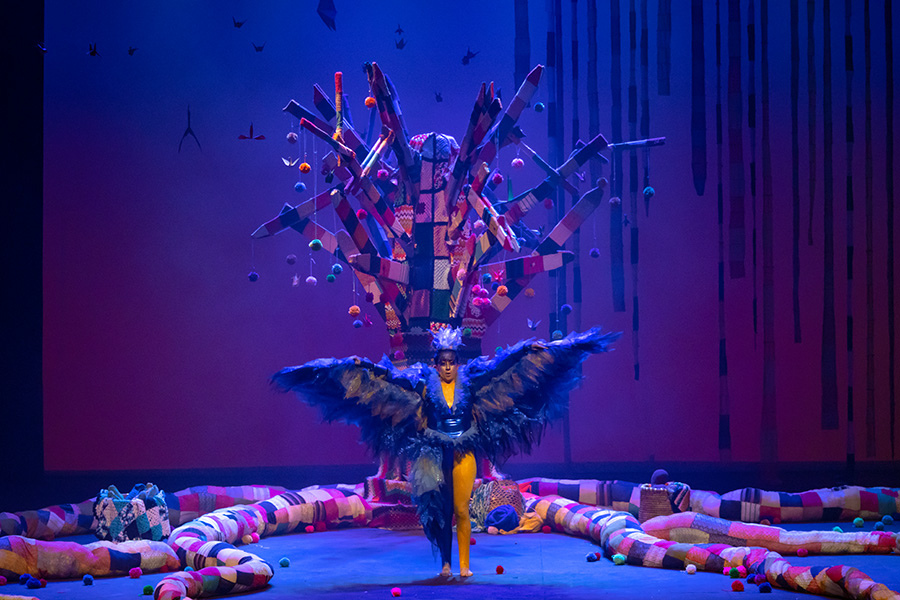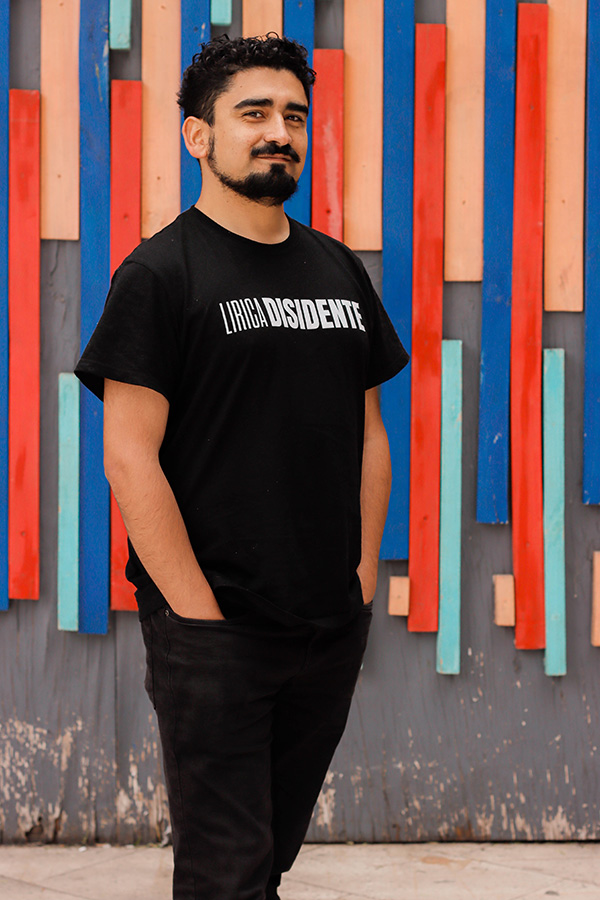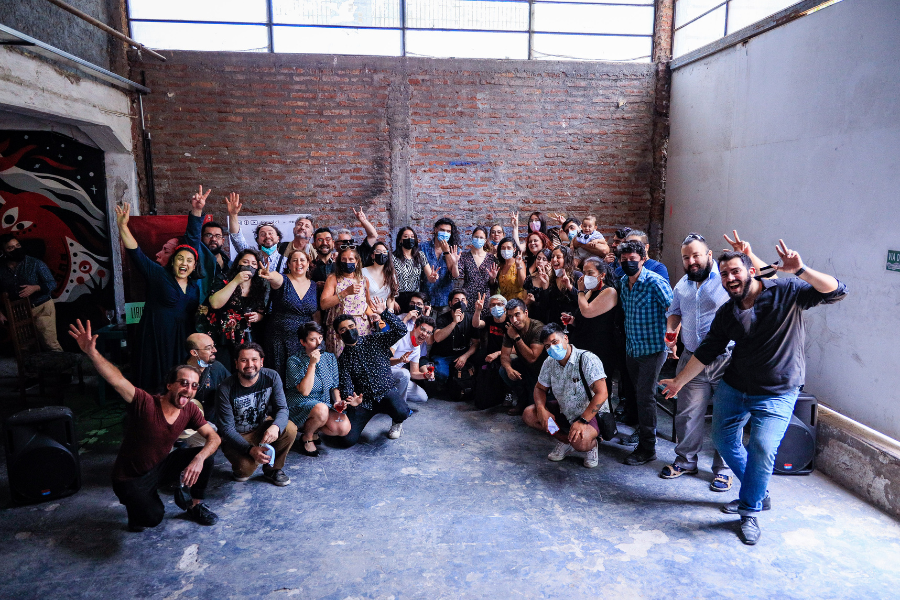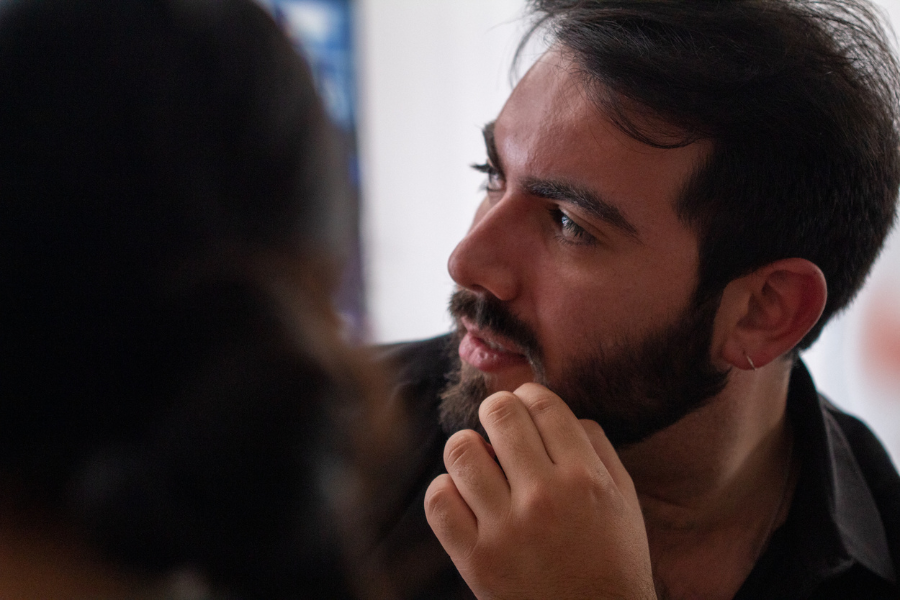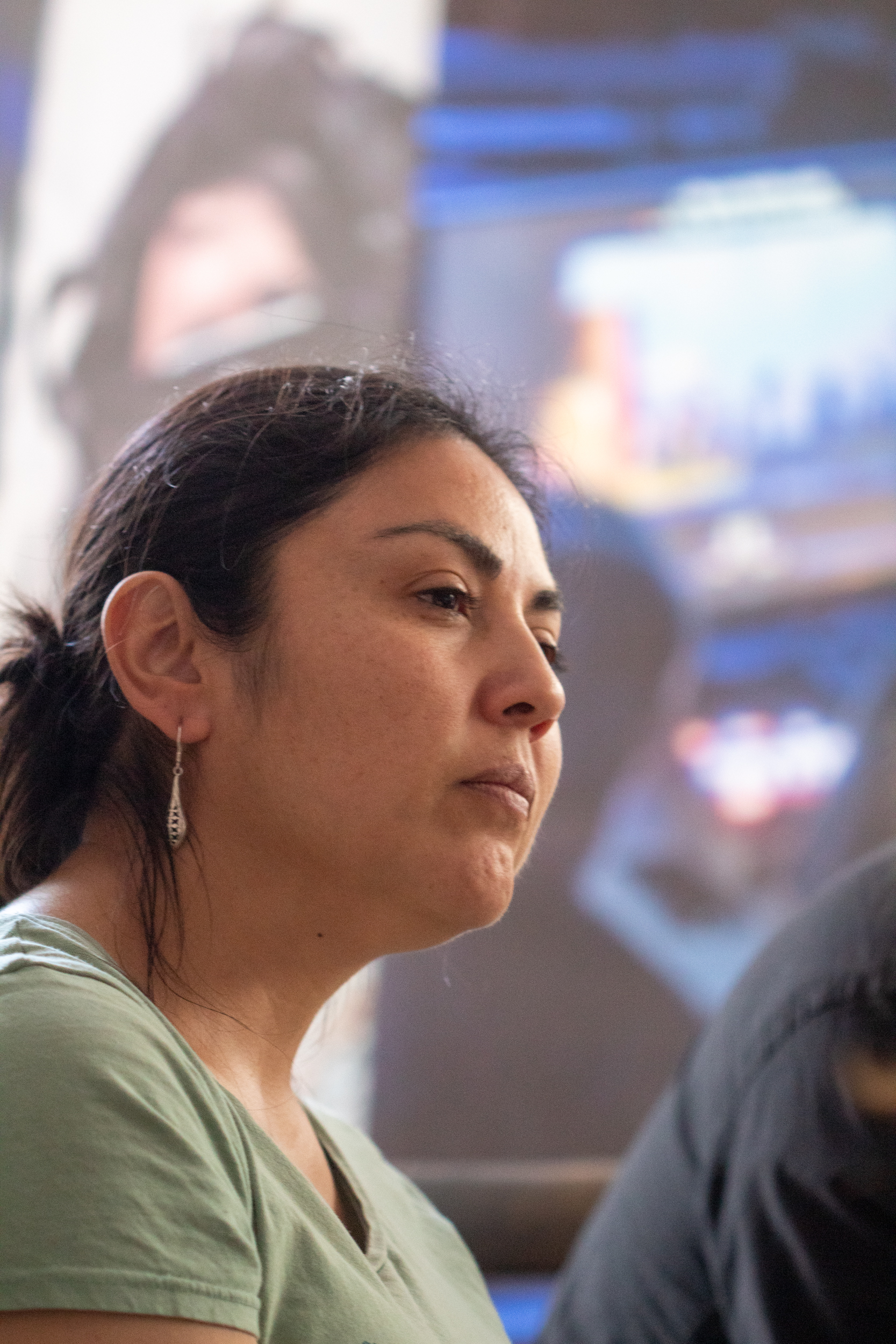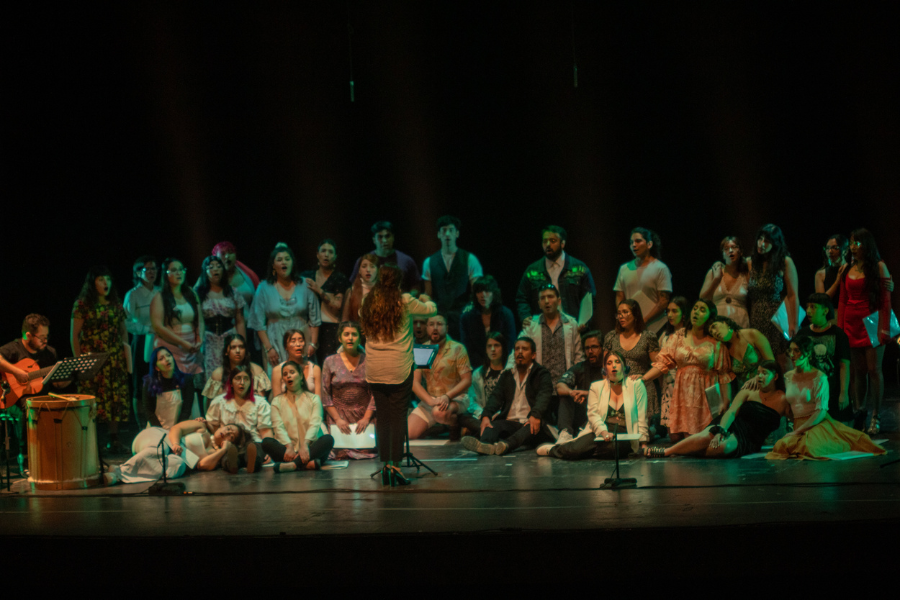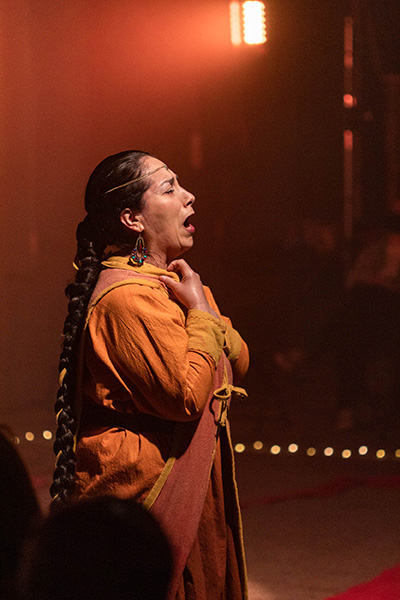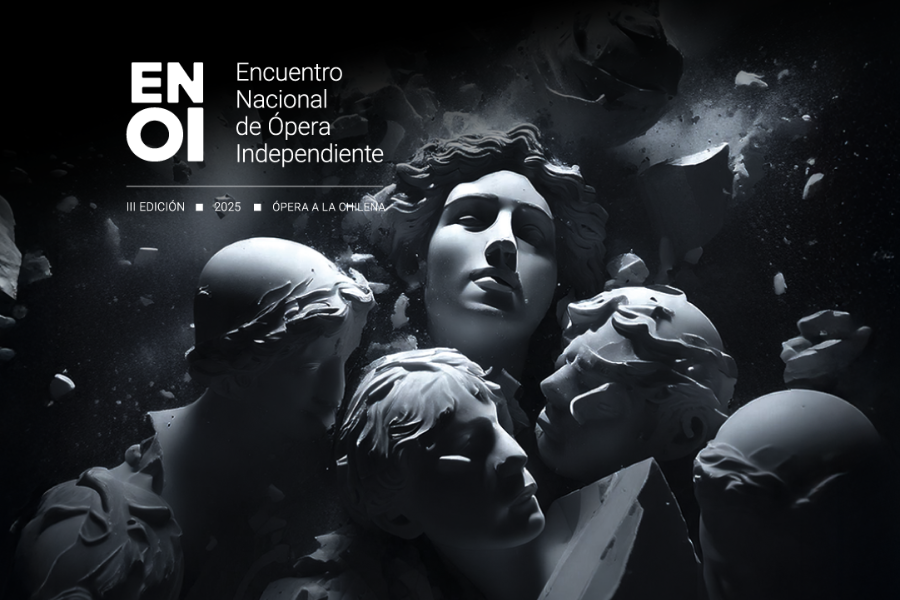Dialogues between opera and society: Lírica Disidente joins OLA

Created in 2018 with the purpose of make a change in the status quo of opera in Chile and generating more development spaces for opera singers in the country, the independent organization Lírica Disidente has embarked on different projects where training, creation and production go hand in hand. Behind this initiative, there is a group of young singers and opera workers, mobilized to catalyze a future in which opera and society maintain a permanent dialogue and in which there are more opportunities to confront precariousness in professionalization. These and other challenges, the reasons for their recent incorporation to OLA and what the next National Meeting of Independent Opera (ENOI) brings in conversation in this interview.
by Álvaro Molina R.
A stage with traditional wool fabrics. A tree with magical roots that rises to the center of a landscape full of colors. A couple who live through love and misunderstandings, advised – not always correctly – by a sorcerer. Music by W. A. Mozart. And, suddenly, a mythological character from the island of Chiloé appears, located in the south of Chile and famous for its stories of witchcraft, ghost ships, extraordinary beings and animals. She is La Voladora, a fantastic woman who transforms into a bird and is an assistant to the brotherhood of sorcerers that inhabits the archipelago, but on this occasion she fulfills the role of mediator between the audience and what happens on stage.
Transferring this setting to an opera open to all audiences was what the Chilean company Lírica Disidente did in 2023 with A Magical Opera in Chiloé, a remake of Bastien und Bastienne, the singspiel in one act written by Mozart when he was only 12 years old.
The reinterpretation – with stage direction by Ignacio Ramírez, musical by Miguel Ángel Castro, scenic design by Valentina Maldonado and Spanish adaptation by Gonzalo Cuadra – goes even further; the setting in the rich mythology and nature of Chiloé, the interventions of La Voladora and the adaptation of the libretto served to put other themes on stage, such as affective responsibility, the importance of communication and care for the environment.
“Our identity is closely linked to reinterpreting tradition, proposing a new look and allowing opera to be for everyone,” explains Nicolás Vásquez, Chilean opera singer, tenor and founder of Lírica Disidente, an independent opera organization that in the last five years has opted to reach those places where opera is not done or known and to propose a change to the precarious scenario experienced by many of the lyrical singers in Chile.
Professionalizing and popularizing are two actions that mobilize Lírica Disidente and its departments or areas of intervention, ranging from educational and training and development initiatives for opera singers to a company that, through the creation, production and itinerancy of operatic productions, seeks to bring opera closer to new audiences and communities. “Our goal is to expand the horizons of opera, looking for meeting points with other artistic expressions to offer new and attractive proposals,” explains Vásquez.
Lírica Disidente is currently preparing for the second version of the National Meeting of Independent Opera (ENOI), an instance that is made up of an opera school around Il barbiere di Siviglia (G. Rossini), with performances in Santiago during July 2024, and a large national call for the composition of new lyrical scenes of small format and short duration.
Regarding Lírica Dissidente’s interest in training from different fields, Vásquez maintains that “training crosses the facets of the opera production chain in a transversal way, which is developed by attracting and forming new audiences, training artists and making it easier for more people to live the artistic experience from the personal to the professional.”
In the following interview, they address the reasons that led the organization to join OLA, the need for opera to be an active part of the cultural dialogue, the challenges to make up for the lack of specialization opportunities for opera singers, and the characteristics that lead the creation of Compañía Lírica Disidente to be a bridge to the different paths where opera and society converge.
Why did Lírica Disidente decide to join Ópera Latinoamérica?
During the last five years, since its creation, Lírica Disidente has developed an organizational culture that has allowed it to stand out in the field of Independent Opera in Chile, a field still little explored.
This culture has positioned the work of the organization as an alternative to revitalize opera in the country. We have done this through national initiatives such as the BAJ School Choir Program in collaboration with Balmaceda Arte Joven, the National Independent Opera Meeting -currently in its second edition and with a large Latin American call for its Opera School-, as well as opera productions and training and specialization initiatives for lyrical singers and professionals of the performing arts.
We are interested in contributing to and participating in regional conversations about the development of opera. In this sense, the link with OLA is essential, since it channels and articulates the efforts of theatres, companies and organizations to give new life and projection to opera in Latin America, thus constituting a unique opportunity to amplify our work and learn from the experiences of those who make up this invaluable network.
What is the identity of Lírica Disidente? Why are you called “Dissident Lyric”?
Lírica Disidente was born from a felt need of opera singers in Chile in the face of the lack of spaces to develop professionally.
If we take that as a starting point and draw a line towards the responses that our initiatives and productions have had, we can see in the trajectory of that line a series of difficulties that the organization had to face to propose a new form of management for independent opera. Difficulties that have become an idea of change and transformation of the installed perception that opera and lyrical singing were only for those who had known how to find it. This also applies to the training and professionalization of those who work in these disciplines, due to the lack of spaces and initiatives.
At this point, a rupture is proposed, a dissidence, from which we seek to propose a change. We want to give validity to our artistic work, linking this language with the communities and dialoguing from our context with the wide range of possibilities offered by the lyrical repertoire. At the same time, we defend open selection processes for our operatic initiatives or productions, opening up opportunities for everyone to grow together with Lírica Disidente. Our identity is closely linked to reinterpreting tradition, proposing a new look and allowing opera to be for everyone.
Part of the work you do focuses on areas of training and education with projects such as the BAJ School Choir and ENOI. What are you interested in developing through these initiatives?
Indeed, we have a declared interest in training in its various areas. In the BAJ National School Choir Program, together with Balmaceda Arte Joven, there have been more than 150 young people from 5 regions of the country who, being part of a School Choir or a Seedbed, found themselves with the choral experience guided by professional opera singers.
In this initiative, the focus of the training had to do with the possibility of participating in an artistic cast and learning about singing and music theory through the experience of learning the repertoires, without the need to have had previous knowledge. Of these young people between 16 and 30 years old who participated in the program, many began their choral life and others will probably always have the ability to connect with the discipline, even as an audience.
In the case of the ENOI Opera School, we go directly to the training and professionalization of the new generations of opera singers. During the pandemic it was the main focus of our activities in virtual format. A series of stage workshops for singers or choirs are also part of the initiatives we promote around training, exceeding more than 180 hours of training, 40 facilitators, teachers or workshop leaders and more than 250 artists and enthusiasts benefited.
We believe that training crosses the facets of the opera production chain in a transversal way, which is developed by attracting and forming new audiences, training artists and making it easier for more people to live the artistic experience from the personal to the professional.
Both in artistic productions and in educational and training projects, there is an interest in bringing opera to new audiences. What is your diagnosis in this regard? What is your view of opera audiences?
Opera attendance in Chile, historically reserved for a small privileged sector, urges us to rethink how opera connects with its potential audience. Beyond adjusting prices or increasing performances, it is essential to assess the value and social relevance of opera and lyrical singing today.
It is imperative that opera be an active part of the cultural dialogue, breaking down the barriers that limit its access. We face the challenge of integrating ourselves into people’s daily lives, in an environment saturated with more immediate entertainment alternatives.
Our goal is to expand the horizons of opera, seeking meeting points with other artistic expressions to offer innovative and attractive proposals. This path towards attracting new audiences is a long-term commitment, in which creators, artists, producers and communicators play a key role, guiding and accompanying spectators towards an active appreciation of opera. We want to understand the various ways in which the audience connects with opera.
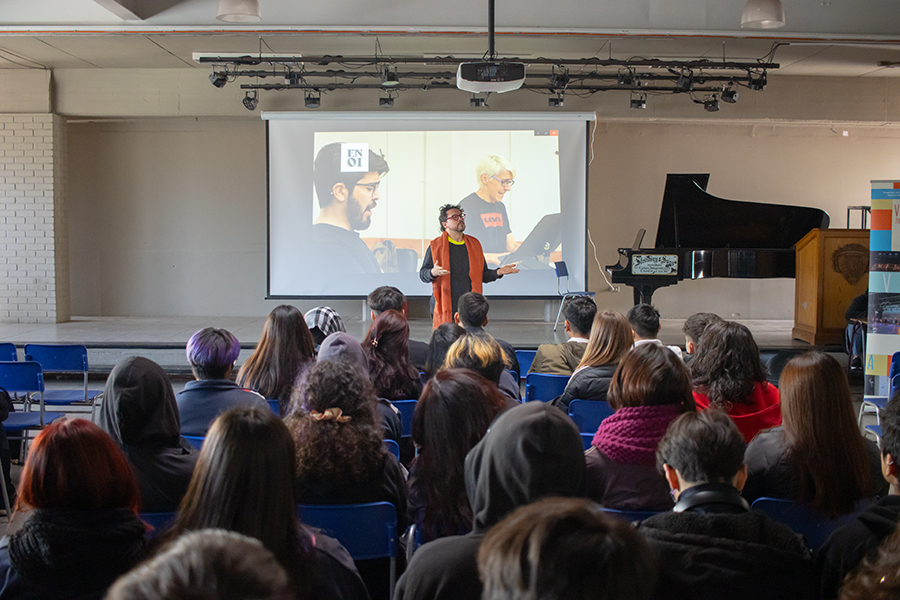
In a mediation activity, Gonzalo Cuadra talks about the opera Bastián y Bastiana with students who will attend the performances in the Valparaíso Region. Photo: Samuel Muñoz.
What are the emphases of Lírica Disidente in its opera productions and why?
We believe that emotionally linking opera language with communities in its most varied forms is the most direct way to connect feelings, thoughts, disagreements and triumphs with the artistic moment, and for this, seeing oneself represented is key. From there we propose that the rereading of the great scenic-musical works be linked to the discussions of society because we believe that in this way artistic expression becomes valid because it continues to converse and interact with the time that interprets it and that is the hallmark of Lírica Disidente.
In a next step, we seek to begin preparing new creations of operatic production, which allow us to work with more current artistic languages and address contingent themes or those that adapt to the Latin American identity and experience. During this year we hope to be able to carry out our first initiatives in this direction.
We propose that the rereading of the great musical stage works be linked to the discussions of society because we believe that in this way the artistic expression becomes valid as it continues to converse and interact with the time that interprets it.
In 2023 Lírica Disidente programmed an adaptation of the opera Bastien und Bastienne where the action was transferred to the tangible and intangible heritage of the Island of Chiloé, south of Chile. Can you tell us what effect the presentation of this adaptation of Mozart had on the audience?
Under the stage direction of Ignacio Ramírez, musical by Miguel Ángel Castro, scenic design by Valentina Maldonado and the Spanish adaptation by Gonzalo Cuadra, the production “A Magical Opera in Chiloé” – Bastien und Bastienne by W. A. Mozart – allowed us to talk from the opera with children, adolescents and families about affective responsibility, the importance of communication and care for the environment.
On a woven stage, with a tree with magical roots, the sorcerer Colás accompanies the couple as they live their loves and misunderstandings observed by an original character of this production, La Voladora. This friendly magical character, played by actress Isidora Gazmuri, is in Chiloé mythology a woman who has the ability to turn into a bird and is the one who helps the sorcerers of the area. In this magical opera he fulfills the role of dialoguing with the audience about the misunderstandings and bad advice of Colás, stopping the action and inviting collective reflections on talking about feelings or the care of the forests.
With more than 1,700 attendees, mostly children and families, with 6 performances in 3 regions of the country, this production had moments of active participation of children, amazement with the magical characters, laughter and shouts of joy. The journalist and critic Joel Poblete, mentioned in his chronicle about this work for Revista Sinfónica de Uruguay that “… It is most likely that this first approach to the world of opera will remain forever engraved in the memory of those who attended…”.
How is Lírica Disidente’s program projected for 2024? What productions or lyrical activities can you carry out?
At the moment we can only talk about the second version of our National Independent Opera Meeting, which is made up of two major programs. An opera school that builds its formative process around the opera Il barbiere di Siviglia by G. Rossini. We open a Latin American call for lyrical singers who wish to participate in this unprecedented and completely free initiative. There will be three performances of the opera in Santiago during the month of July.
In the second program we find a great national call for the composition of new lyrical scenes of small format and short duration. Our goal is to provide easy-to-produce repertoires for independent opera, as well as to contribute to the construction of a national identity around opera, as the program defines paths of inspiration related to the history and culture of Chile. All the information about the activities of the National Meeting of Independent Opera ENOI 2024 – Connect with the Opera can be found on our social networks or www.liricadisidente.cl.


